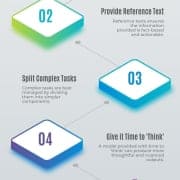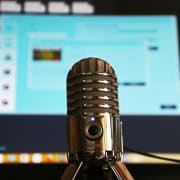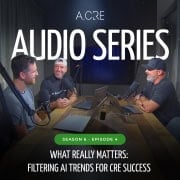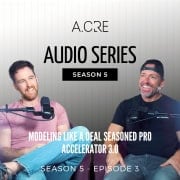Introducing AI Edge – The CRE Playbook for Staying Ahead | S6E6
In this finale to Season 6 of the Adventures in CRE Audio Series, Sam, Spencer, and Michael share an exciting new initiative: AI Edge—a first-of-its-kind program designed to help CRE professionals become AI native. After a season exploring the power, complexity, and opportunity of artificial intelligence in real estate, the team turns their attention to what’s next: How do professionals actually take action and build an edge that lasts?
AI Edge isn’t a course—it’s a membership, a system, and a movement. It delivers curated insights, up-to-date skills, powerful tools, and a CRE-focused community all in one place. Whether you’re a student looking to stand out or a seasoned pro navigating a wave of change, this episode introduces the solution that helps you go from overwhelmed to indispensable.
Watch, listen, or read this episode to get a preview of what’s ahead in Season 6 of the A.CRE Audio Series!
- Be an AI leader in CRE, join the AI.Edge
Introducing AI Edge – The CRE Playbook for Staying Ahead
Or Listen to this Episode
Resources from this Episode
- A.CRE Real Estate Financial Modeling Career Accelerator
- Education in Real Estate
- A.CRE Audio Series
- The insurance policy your real estate career needs to thrive in the era of AI. That’s AI.Edge: https://theCREedge.AI
Episode Transcript
Sam Carlson (00:08):
All right. Becoming AI experts in CRE, we just finished a season where everything was about artificial intelligence, and I think we were very expansive, but there was also the undertones of what do I do next? To some extent, I think you’d agree. And Spencer, you and I were talking about this a couple of months back, and we were discussing education, getting people up to speed on artificial intelligence. Let’s tell people about that conversation
Spencer Burton (00:38):
I think it was, we were exploring the differences between mastering real estate, financial modeling, and mastering ai. And the primary difference being that cashflow modeling is a well established concept. It’s largely static. The learning of it is progressive over time, and you continue to learn and we talk about how you learn that skill the same way you learn to say, play an instrument, but the subject matter itself is static. And therefore Michael and I in 20 circa 2018 can draft a curriculum that largely is the same today, although we’ve continued to add to it with more advanced concepts. What you have in this domain is really a new frontier. And anytime you have a new frontier, especially in the early days, things are constantly changing. I mean, we read an article this morning a little clickbait by llama index, which was RAG is Dead. Okay. And why that was funny to us is we had just released our lesson on RAG versus fine tuning the night before we had a case study. Yeah. Night or two before we had a case study on how to use RAG to reduce hallucinations. Now when you actually dig into the article, it’s not saying RAG is dead, it’s saying that traditional like naive rag was determined is now being replaced with more advanced agentic Rag re, in essence. But anyway, the point being
Sam Carlson (02:19):
This is
Spencer Burton (02:20):
Constantly changing. And so we’re discussing this, okay, how do we arm A CRE members, whether accelerator members or not with the AI skills that they need if it’s constantly changing. And from that came some ideas as we whiteboarded this. The first is, this can’t look like the A CR accelerator, our flagship program for teaching people real estate financial modeling. And it can’t purely be about the knowledge piece, although that’s important. It needed to have multiple legs that this would stand on it. It needed to be an ongoing thing. And really, it’s almost more like a club,
Sam Carlson (03:06):
A group, a membership of sort. Yeah.
Spencer Burton (03:08):
Yeah. We’ve talked about this concept of being AI native, being the person in the room that everyone turns to when they have a question about ai. As firms are exploring implementing different AI solutions, they want to have someone to turn to that can help them build those solutions or execute those solutions. And that’s not something that you go and take a semester course on or sign up to an online course. And now you’re that person. It’s stale before you even finish the course, let alone it becomes stale before the course reaches you. So anyway, that was the discussion we were
Sam Carlson (03:42):
Having. Yeah, you would have to recreate, I remember talking and being like, we’d have to recreate this course every three months and there’s no possible way. But we did end up in the accelerator creating a core curriculum, I guess you’d say, or a starting curriculum.
Spencer Burton (03:57):
So what we did or what we’ve done, and this continues to be very much an important component of our advanced level of the accelerator. So this is beyond the core. The core are the fundamental modules, components of modeling real estate, cash flows that we teach in our core. It was what we originally released in 2018 and continues to be used now widely across organizations, across universities, individuals and so forth. So we have this advanced component of the accelerator, and in that we have various endorsements where you can can dive into advanced topics around partnership modeling, portfolio modeling, that sort of thing. And it became clear to me 2022, leading into 2023 that this was going to be a technology that would impact our people.
(04:49):
We began to share our learnings around ai. And yeah, last year we launched an AI in CRE curriculum that’s part of that advanced component of the accelerator. But the issue with that, it’s twofold. First off, it’s not an issue at all for accelerator members who are there primarily to master real estate financial modeling. And they now also can expand their AI skills. But not everyone is at that same stage. Some are mid or late career. They’ve already mastered real estate financial modeling. They don’t need to sign up for an accelerator program to gain the AI skills and or someone who is in a functional area of real estate that actually doesn’t require real estate financial modeling, but need to master these skills.
Michael Belasco (05:35):
You’d argue the breadth and depth of what you need to learn. It’s almost somewhat separate. There’s a lot of compatibility, but it can be separated and on its own, the whole AI generative I component and at the pace, and as you’re mentioning, there’s this staticness about a course which is great for financial modeling, but the pace at which all this is changing it, there’s a loss again by the time it gets wrapped up.
Spencer Burton (06:03):
Let me just reinforce this point. There is a lot of value in learning to build dynamic real estate financial models as it relates to ai. I mean, you think about the framework we use to model cash flows, inputs, calculation, modules, outputs, the same framework that we use to instruct AI models, ag agentic systems, inputs, some instructions, some logic, and then some output. So there are absolutely parallels between what we do in cashflow modeling and the accelerator and ai. But look, if you’re sitting in a leasing team, I’m not sure, and in some cases, real estate financial modeling would be valuable, especially if you want to get to say the investment side. But for a lot of leasing professionals, they greatly benefit from AI skills, less so for cashflow modeling skills.
Michael Belasco (06:58):
Got it. But to learn the tools, by the way, there is a lot of measure. I mean, we see through the a c consulting arm, there’s a lot of larger institutions that are reaching out about how are we integrating? They have a massive, massive amounts of data, not only internally, but from third parties that they’re trying to integrate and how can we utilize whether it’s automations or generative AI approaches, but you can learn those things. They can be learned in a vacuum somewhat. And then there’s this integration. And so to be able to focus on each I think is a critical piece, especially at the pace of which generative AI and all that stuff in that space is changing. Where again, modeling’s static. You go in your dark room, you close the door, you sit there and you learn those core things. You learn about real estate finance. Again, Excel is the medium by which we teach and what is standard in the industry of how to learn that stuff. But the reason we’re creating what we would call kind of a club is because,
Sam Carlson (07:56):
Well, let’s move on to that piece because so we have the dynamic of us looking at this problem. This knowledge needs to come to the audience.
Spencer Burton (08:05):
So that’s for the knowledge piece, but there’s more to it than that.
Sam Carlson (08:07):
Well, hold on. So we have the dynamic that we were dealing with. Sure. There’s another dynamic here, and it’s a splintering audience. It’s people becoming aware of what artificial intelligence is, and they’re looking for, well, what do I do?
Spencer Burton (08:21):
Well? So we are very fortunate to be able to speak to universities almost during semesters every week with these speaking events. And from that, we get feedback, we get questions, and everyone’s talking about AI right now. And so inevitably though, pretty much every event this question comes up, where do I learn about what’s happening at this point in time? There are dozens of newsletters, and I put that in air quotes. Generally coming from the tech industry that you can read, there are personalities on social media that are putting out content virtually every day. There’s a lot of noise from the commercial real estate perspective. Most of it is noise. Most of it’s irrelevant to us, even to the ai, the person that is truly AI native in our industry, I would say 97% of the AI news that’s out there is just noise. It’s irrelevant. And so I don’t have a great answer for these students who ask this question, what do I read first? It’s like, well, I mean you’re just going to have to sift through a lot of noise. You’re going to have to use your best judgment to determine what’s signal, what’s real, what’s actionable, and what’s just noise. And that’s another problem that we’ve explored. That’s a problem we don’t deal with in real estate financial modeling.
Sam Carlson (09:48):
So you have this dynamic between us and the audience and AI coming in. These are all the forces acting upon us with this is an incredible opportunity for those people who in the words, as we discussed through the season, who become AI native
Spencer Burton (10:03):
Before you get to opportunity. Because that’s the big one. And I’m the perpetual optimist. And one of the reasons why Michael is, no offense, my favorite partner is he’s the perpetual pessimist. He not, he’s an optimist in a lot way. It’s not that bad.
Sam Carlson (10:22):
He’s gotten better over the years.
Spencer Burton (10:24):
He’s the perpetual worrier. I don’t know how else to describe it. I mean, that’s why we started a CRE is because Michael was worried, and it’s one of the things I love about it. And so there is a segment, and by the way, the worry is real that if they don’t figure this out, they’re going to somehow fall behind, lose whatever term you want to use. Whether that’s in the context of I won’t have a job anymore, whether that’s the context of my company is going to fall behind and lose the edge that we’ve built. And that anxiety is real, perhaps overstated, perhaps a bit emotional, but very real because there’s fundamental change happening right now. And people need an insurance policy against that.
Michael Belasco (11:13):
And first, let me clear, I wouldn’t say I’m an eternal PEs. I think there’s opportunity. We’re recording this podcast right now. Get it on the end of the cloud before we go. Are you sure that we got that last one? Make sure it’s there. One of the core things at Acer, we launched this company, we call it the by accident company. We launched this website to put out models for the industry. We were two nerds building Excel models. And what it turned into was we found a way to give people, and this was by accident by the way, a competitive advantage to get a job. The win for me was to start this thing. I could get a job. I didn’t come from a Wall Street or finance background, and it was my resume piece to land me in a large institutional real estate shop.
(12:04):
It worked. And other people saw that value. And so what this became was a way to help people get a competitive edge and an advantage to helping them secure a job from something that otherwise really didn’t exist before. And through the thousands of people that went through the accelerator, we’ve heard it repeatedly. This helped me along. This helped me land my job. This helped me get ahead. This helped me get the advantage. And three years, when Spencer first was bringing this to the table, it was like, this could be something on the horizon, which people need to learn. You either learn it or you become part of. I remember we used to say, get your resume on top of the stack when you would add the accelerator training. Now it’s
Spencer Burton (12:48):
Super edge.
Michael Belasco (12:49):
Wow. This is the same thing right now. We are fortuitous, I think in this moment to see that get in early. The difference is when we were in school, all the interns would come back from the internships and we’d be looking at miles. There was all this precedent, and we could pick and choose what we thought. And then we built on those sort of building on the shoulders of giants. These people come back from great shops, and we learn that’s the difference here. That doesn’t exist yet where the giants haven’t shown up yet. But we do know because we’ve seen how practical, just general AI use has been easily 10 x my work output. So I think right now is the moment where we can stay true to our mission, which is give people the competitive edge to make sure that they get on the top of the resume where they can go out and launch their own companies. And this is the next iteration or step in adventures and res. Yeah.
Spencer Burton (13:41):
So I went to fear and Michael immediately pivoted opportunity.
Sam Carlson (13:44):
I was just going to say he’s very optimistic. Now he wants to prove to the audience. I’ll say just rising. We just had a hiring manager as a little plug for the accelerator, say that it just so happens that a hundred percent of the top candidates for the job that they’re hiring for happen to be accelerator grads. So Spencer, back to
Michael Belasco (14:02):
Too much optimism for you back to
Sam Carlson (14:03):
School.
Spencer Burton (14:04):
Yeah, yeah. Bring it back down. No, no, no. I want to now just piggyback on the opportunity because that’s where, again, look, I’ve been in the industry 20 something years, which means that I have really one marketable skill, and I’m taking a big risk myself personally in going all in on this. Okay? Now, I don’t think of it as a risk because I have such clarity around this opportunity. It hasn’t been an opportunity more clear to me than this. And so those who are listening, those who are watching, let’s say you’re in school, you’re looking for the first job. Let’s say you’re looking for the next job. It has never been easier to show up and have an edge
Sam Carlson (14:45):
And be suit.
Spencer Burton (14:47):
You build an AI agent that does some small little thing that improves their
Sam Carlson (14:51):
World. They’re like,
Spencer Burton (14:52):
Done, done,
Sam Carlson (14:54):
Done.
Spencer Burton (14:56):
And I hope everyone heard that’s taking some notes and doing that. And if you’re mid-career, look, build something so that you show up for your annual review. It’s like, I saved the company a thousand hours this year because I built this AI tool that does X, Y, and Z. There’s never been a time where it’s easier for people like us
Sam Carlson (15:18):
To stand out,
Spencer Burton (15:20):
But highly proficient in our place, our practitioners to be able to stand out and be able to gain an edge. And especially considering most are just sitting on the sidelines watching it. They’re doing their little chat GBT thing, and that’s all fine and good, but those who just put a little bit of time in quickly can gain an edge in a way that they never would’ve.
Michael Belasco (15:44):
And those that are unsure about where to begin or where to start. And again, as Spencer mentioned earlier, there’s still a little ambiguity to that. But the goal of what we’re putting out here is that we are taking a hard concerted effort based on all of the stuff that Spencer’s brought to the table this past couple of years, to clear that out and give people that, because some of it’s not only I’m just sitting here, some of it’s where to begin.
Sam Carlson (16:07):
Well, that’s our next thing is so we understand where we started. We understand the audience. We understand the dynamics and the opportunity. What is the resolution? What is the solution for how we’re going to help people become AI native?
Spencer Burton (16:22):
So this is what we’re bringing to the A CRE community. It’s what we’re calling the AI edge. It’s a monthly,
Sam Carlson (16:32):
I think it’s a member, yeah, club
Spencer Burton (16:35):
Membership, what you want to call it. But in essence, it’s meant to get people AI native and in a structured way. And when we thought about, okay, what does it take to be AI native? It’s more than just knowledge. So we actually start with clarity. We talked about this concept of noise versus signal. What we built is an engine that finds signal. And so on a monthly basis, there will be an intelligence brief that all AI edge members will receive a single intelligence brief in the same way that the president gets, Hey, this is the stuff that matters.
Sam Carlson (17:19):
There you go,
Spencer Burton (17:19):
The intelligence brief. These are the signals related to AI that matter to us and our industry.
Sam Carlson (17:25):
It is curated. You don’t have to wade through all the overwhelming complexity.
Spencer Burton (17:29):
So that’s number one, the intelligence brief, right? It’s like let’s make sure that you’re armed with the knowledge that you need, such that when people are asking you and your company, Hey, what’s going on with this? Hey, I read that you’re armed with it, but you don’t have to read something every single morning. We’re too busy. We actually have deals to get done. Okay? That’s what we want. Intelligent period. The second is the knowledge. So it starts with this foundation that gets you to the point where you understand the technology.
Michael Belasco (17:58):
Practical knowledge, not practical knowledge.
Spencer Burton (18:01):
Yeah, practical knowledge. Yeah. So it is concepts, techniques, it is the curriculum that currently is available only to our advanced members will be available also to members of our AI Edge. But in addition to that, so that foundation that one can take, and so long as they’re a member, they have access to that entire curriculum. They’ll also get a skill drop every month. So think of the skill drop as another lesson that is timely. We talked about, or I mentioned Agentic Rag. That’s a whole lesson. That’s a pretty important lesson. It’s distinct from naive RAG and requires more than just simply a mention in the intelligence brief because you’re going to be using now agentic Rag in a way that is distinct from your knowledge about rag. And so we produce a lesson, it comes with a case, and so you get some hands-on work with that concept. And so that’s the second piece, the skill drop, the third, you might call the opportunity kit, but these are capabilities we want to arm our AI edge members with ways in which they can multiply their output,
Sam Carlson (19:24):
Pre-fire it out. They take it from one point.
Spencer Burton (19:28):
So it starts with the existing opportunities capabilities, but those are constantly changing as the technology changes what worked or what made sense or what was a true multiplier today or a year ago is not the same today. And so every month we’ll drop a new multiplier. And it could be as simple as, actually you gave a great example with the deep research coupled with notebook, LM to the notebook, lm, right? Okay, two different tools that you use. Let’s pair those together. Let’s show you an example of that. That’s an example almost tutorial. And it’s different from knowledge that is like practical. If you do this, this, and this, you’ll multiply your output. You’ll look more impressive to your peers, but more importantly, you’ll save a ton of time and time is money. But also there’s tools. So it may be a tool that a member of the A CRE team builds. It could be a lovable app that you can fork and use on your own. It could be a custom GPT that was built that a member of the team found sufficiently useful that the AI Edge deserves to have access to it. So that’s the call it the opportunity kit. And then we have a few bonuses that we’re going to throw in there, and I won’t go through all of ’em. The one I find cool is the personal advisory committee.
Sam Carlson (21:03):
That one’s going to be fun. That one’s going to be a lot of, I’m actually
Spencer Burton (21:05):
Very excited about that. So this is actually an idea I got from a podcast. I thought it was so cool. And so we put the team to work to build it. So here’s the idea. There’s this body of knowledge that’s espoused by people and firms that have either currently exist or have since passed on. Some of them are real estate specific, some of them. And in another episode we talked about how Sam had trained an agent to have the knowledge of his grandfather and then could respond. Well, imagine that you had a advisory board with different life experiences, different opinions,
Sam Carlson (21:49):
Strategies,
Spencer Burton (21:50):
Different strategies,
Sam Carlson (21:51):
Roles.
Spencer Burton (21:52):
And they would sit around the table and you would pause at a question to the advisory board, and then you would watch them debate that question, and then you’d get input from each one of them, but not to you. They would actually debate one another and there would be a discussion, and then out would come some output, which is the results of that discussion. So you’d watch the discussion in real time, and then there’d be some useful output. Think of the knowledge of, let’s call ’em
Michael Belasco (22:20):
Titans
Spencer Burton (22:22):
And in illustrate or out of real estate, Ben Franklin, for instance, right?
Michael Belasco (22:26):
Yes.
Spencer Burton (22:27):
Ben Franklin could sit on your advisory board. So that’s the idea of your own personal advisory board. And our ambition is that over time we add more and more people to the roster, and then you choose who you want on your advisory board.
Michael Belasco (22:44):
You can draft them when you first get onboarded.
Sam Carlson (22:48):
It’s pretty incredible. So I’ll just summarize so we can have one concise AI edge is all about what, right? First, we’re going to do a curated intelligence briefing every single month. We’re going to, instead of you going out and sifting through all of the noise, we will just curate it. It’s delivered there for you. Then we’ll have a skill drop. Okay? There’s one thing to know what’s relevant, to know what to pay attention to. There’s another thing, well, what should I be doing? What skill do I need to be honing right now without, again, buying constant courses or whatever? Because this was one of our problems. It’s like, well, if we create a course, we’re going to be recreating it every three months. This alleviates that. Then we have the Apply AI core curriculum, which is your foundational knowledge, if you will. It’s what we currently have, and it’s a great baseline.
(23:43):
It’s included in this membership. And then we would have the opportunity kit, which are useful things, and the fund little advisory board, but other things that will be included that will once again be over time developed. And maybe even if we do this right, this community will start to create and open source other solutions, which is an ambition I know we have in terms of collaboration and things along those lines. And all of this will be within the AI edge. So people can become the native AI expert in commercial real estate wherever they are, if they’re by theirselves a sole practitioner, or if they are a part of a bigger company for everybody aspiring to that particular status. Is that an accurate
Spencer Burton (24:33):
That’s exactly right. My estimation is that 10% of our industry will be this type of person, and I think they’re going to win.
Sam Carlson (24:42):
They’re going to win.
Spencer Burton (24:42):
And we want a place for those 10% of professionals industry to come to get the intel, to get the knowledge, to have the tools in the community in order to achieve that.
Sam Carlson (24:55):
I think we should talk to those 10% for just a minute. I mean, if you are a person either early in your career or you want to take your career to the next level, this is exactly what you’re going to need. I don’t think if you read between the lines, it’s not our collective sentiment that AI is a fad in the slightest. I think it’s also our collective sentiment that there is nothing but opportunity for the AI native person, and this is our solution for that.
Spencer Burton (25:27):
So speaking directly to that person, okay, how do you know if you’re that person? So when I think of that 10%, I won’t say his name. I don’t want to embarrass him, but I worked at a firm and this person I thought the world of, and he’s exactly the sort of person. When there was a problem with a certain thing, they always went to him. And it’s because he put in the time to learn that thing that others hadn’t. And what it meant is he’s indispensable to this firm. He’s highly respected because he put in the time to learn that thing in a way so others don’t have to, but it’s served him well. I think the same thing will happen with ai. There’s going to be that one out of 10 people in the room who says, you know what? I want to be the one with the AI edge. And you’ll be the one that people come to when they’re like, Hey, well, I just read this thing. Or, Hey, I want to do this. Can you help me? And you’d be like, oh, yeah, we will create an AI agent for that, and we will integrate it with this and that. And yeah, we’ll save you. That takes you two hours. That’ll take, we’ll do that in two minutes, and you’ll be that person. And what it means, if you can reach that point, your career set,
Michael Belasco (26:52):
And if you’re one of those folks looking for the opportunity into one of these companies that you’ve aspired to get into, now the playing field is level. That’s a good point. And there’s now the opportunity there never was before to get in and then become that indispensable person.
Sam Carlson (27:09):
That’s right. So wherever you’re watching this video, or maybe you’re listening to this on an audio series, there will be a link surrounding it somewhere. You will click that link and you will go to the next page where we will help you take action on wherever we’re at now. We are recording this in the beginning of June. We have ambitions to launch this in a future date, which I won’t say on this podcast. However, it will be coming out, and it will likely be live by the time you watch this, or at least there will be a waiting list. So you want to click over and get on that waiting list so that you’re ready and you can be part of this movement. So that’s all I have. Anything else from you guys?
Michael Belasco (27:49):
Nothing from me.
Sam Carlson (27:50):
Let’s go. Let’s go. All right. Get ahead or fall behind. That’s right. Season six. That’s a wrap.
Announcer (27:57):
Thanks for tuning into this episode of the Adventures and CE audio series. For show notes and additional resources, head over to www.adventuresandcre.com/audio series.








